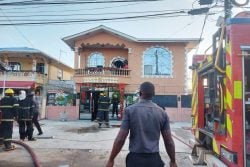Marsha Hinds
Marsha Hinds is a post doctoral fellow in Gender Studies at the University of Guelph, the immediate past president of the National Organization of Women of Barbados and the co-founder of Operation Safe Space. Marsha is a practicing advocate for women and girls in Barbados. Her research interests include the Caribbean intellectual tradition, Caribbean women and girls’ equity and the systemic relics of racial slavery.
On August 1, 2018, I started serving as the deputy chair of the Government Industrial School in Barbados (called the GIS), on the appointment of the Governor General and at the pleasure of the Minister responsible for reformatory schools. I must admit that although by that time I had been working with women and girls’ advocacy for just about 18 years, I did not know much about the school. Every child who grows up in Barbados will get a threat or two about being sent to GIS for being ‘own way’ but the truth is not many people who grow up in middle or upper class Barbados will ever be in danger of interacting with the institution.
The Government Industrial School was opened in 1883, forty-nine years after the abolition of slavery in the British Caribbean. The major purpose of the school was to house children who did not have parents or whose parents did not have the means to provide for their children. The Industrial Schools across the Caribbean extracted free labour from children in exchange for shelter and clothing. Flogging was allowed in the schools and researcher Dr. Shani Roper reported in a recent online forum on the topic of “Children in State Care” that records show that Barbados used the most flogging. The early 1900s saw the passage of two pieces of legislation the Reformatory and Industrial Schools (1926) and the Juvenile Offenders Act (1936). These two pieces of legislation are still what govern the fate of children inside the juvenile justice system in Barbados in 2022. Despite the amendments to the Act over the years it is still archaic and ill-suited to govern a modern juvenile justice approach. It is gaps such as this in colonial repair that tempered my excitement about Barbados becoming a republic in November 2021. If you are still governing the future of Barbados under repressive, colonial laws, what sense does it make to expend money we borrowed on an extravagant ceremony, when the lives of the majority of Barbadians stand to see little to no improvement or material change?
A part of the responsibility of the Board of the School was to conduct inspections to ensure that all was well. The fact that I had enough audacity I saw it as accountability to actually carry out the inspections was what eventually led to me being removed from my position in March 2021, after I made the decision to whistle blow publicly when I learnt of a 14-year-old girl resident being held naked in a cell under conditions of solitary confinement. That incident was not where my journey with anomalies related to the children in care began. It was very much the ‘straw that broke the donkey’s back.’ When I started my tenure, there appeared to be neither annual reports nor financial reports that I could find going back at least two and a half decades. Although the School is a government entity, it had never appeared to attract the attention of the auditor general nor other state control mechanisms like the Child Care Board. On my first visit to the Government Industrial School, I requested to see the breakfast service for the male residents of the School. Numerous people had reached out to me with complaints about how the children of the facility were being fed. That visit, breakfast was served around 8: 30 in the morning. I remember asking whether dry cereal and fruit was put out before that. I was told that it was not. The reason for my question was that the residents of the GIS would have been accustomed to a routine that required them to be at school by 8:30 in the morning. Many of them, unless they lived across the road from the school they attended, would have had to be awake between 5:30 and 6:00 in the morning to catch school buses or other types of transportation to school. Having breakfast at 8:30 put them 3 hours behind their usual schedule.
The breakfast served at 8:30 consisted of canned spam that was fried with two or three crackers and a cup of hot chocolate per child. There was no water offered, there was no fruit offered and there were no alternative food selections. The breakfast offered was not enough to satisfy teenaged boys. Trying to report what I had seen quickly brought me face to face with another reality concerning the set up of the School. The Board of the Government Industrial School is advisory. That means that the Board only creates policy positions and passes those onto the Minister. Based on how government structures in the Caribbean work, the Minister would then have to pass the requests back to the Permanent Secretary of the Ministry, whose task it then is to instruct the senior administrative staff of the school. The cumbersome reporting lines are part of the disconnect in policy and practice at the school.
The second major concern was the lack of educational and skills training programming at the school. The GIS is housed under the Ministry of Home Affairs, like the adult prison facility. There is no official document or memorandum of understanding establishing a status between the school and the Ministry of Education. There is no clear protocol on whether residents remain on the register of their substantive schools. The residents who can continue schooling in regular educational settings are not allowed to do so. There is an ad hoc programme of education offered by the staff of the GIS, but there is no curriculum developed, there are no individual educational plans created for the children and those who do complete Caribbean Examinations Council (CXC) certification are largely self-taught. ‘In contravention of the rights of children deprived of their liberty, children who complete CXC while resident at the GIS have Government Industrial School printed on their certificates, which means that potential employers will know that they were in conflict with the law, even though juveniles are supposed to have closed criminal records. In a small society like Barbados that is a branding that is hard to overcome in the job market.
A third frustration was how outdated and archaic frameworks for juvenile justice in Barbados were continuing to have negative impacts on children in the juvenile justice system. Although there were stacks of policy documents, reports about concerns that UNICEF had highlighted and commitments to update laws and change practices at the ministerial and governmental levels, the same abuse that was outlined by residents of the institution as far back as the 1980s continued under my tenure as deputy chair. Simple actions had not been taken. For instance, UNICEF reclassified children in the juvenile justice system into children in conflict with the law and children in need of care. Given the history of the industrial schools in Barbados and the Caribbean, where children were criminalized at Emancipation or in the interwar years for not having family or for being poor, establishing these two clear streams was an important first step in terms of transforming the juvenile justice system. It paved the way for the removal of archaic charges – such as wandering to be discarded. There are institutional abuses at both sections of the Government Industrial School but the charge of wandering has gender specific implications for girls.
Girls who were facing family instability, which often resulted from them being raped or molested, were being charged for wandering as they tried to escape abuse. Girls who faced abuses in other state facilities and tried to escape these environments were charged with wandering. Girls who had started normal teenage exploration of sex with youth in similar age categories to them were charged with wandering. In many cases, these children only came into contact with the juvenile justice system because their parents reached out to the state apparatus to try to seek help and support for their children and not because they wanted them incarcerated. The parents were then overruled when their children were made wards of the court. Although their parental rights were never officially revoked, they lost the ability to make medical decisions for their children, educational decisions or further decisions about legal outcomes. When girls are charged with wandering in Barbados, they are forced to have vaginal examinations as a part of the police investigation process. They are given the morning after pill as well. Even if attorneys at law representing the children or parents do not give consent, these measures are taken.
I suggest that the juvenile justice system in Barbados is completely broken and despite the country having international obligations under conventions such as CEDAW, the Convention on the Rights of the Child and The Inter-American Convention on the Prevention, Punishment, and Eradication of Violence against Women (Belém do Pará), old colonial practices persist. The Minister has a substantial amount of power to change the situation at the GIS. While the previous Minister has released some of the children in the facility in need of care, the current situation remains that girls charged for wandering continue to be criminalized. Unless the region and the world pay attention, the children of Barbados will not be safe. Coloniality has distorted our national consciousness, and only a renewed sense of outrage locally and beyond can awaken change.
This case is also a reminder to us in the women’s movement that although we have gained much over the years there is a continuous monitoring that is critical especially in our post colonial localities. Where there are issues such as these ones that cut to the heart of social injustice, we must be able to band across our respective sectors and raise a collective voice of chagrin. All help is needed, across the regional waters and beyond.





